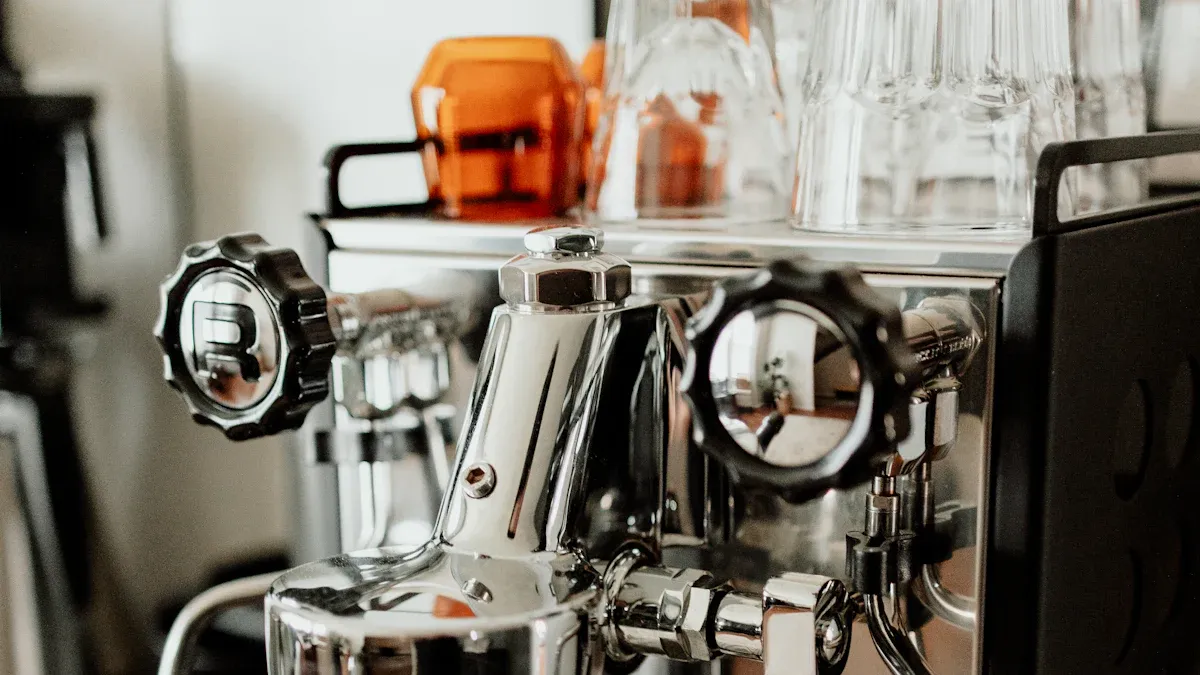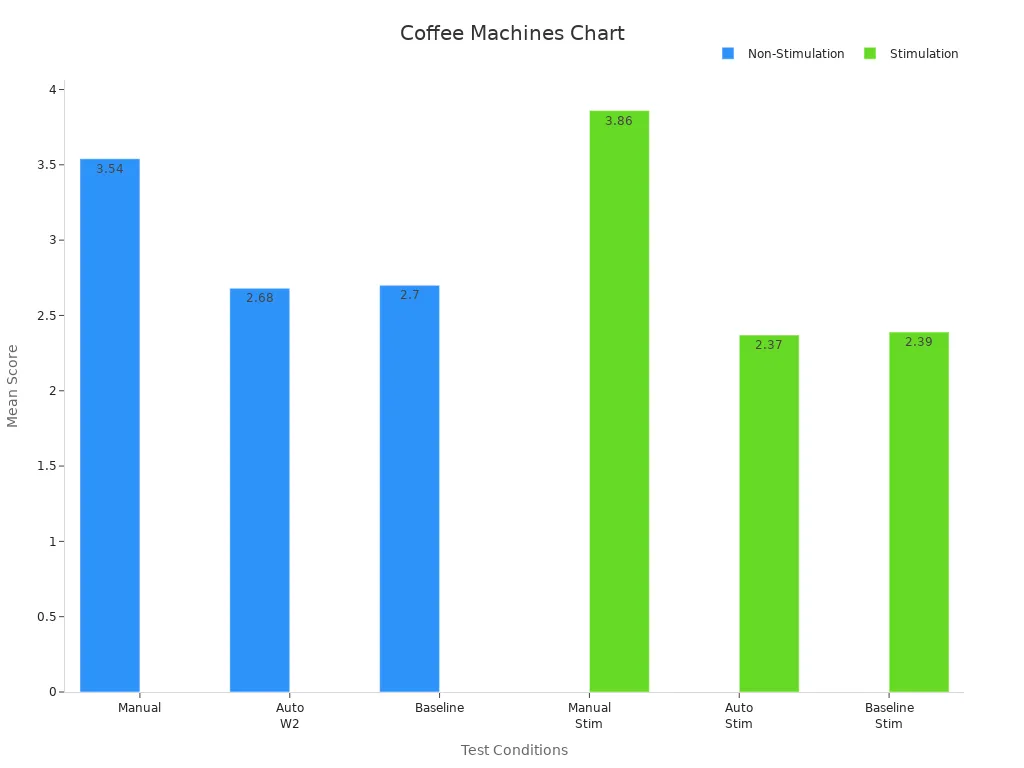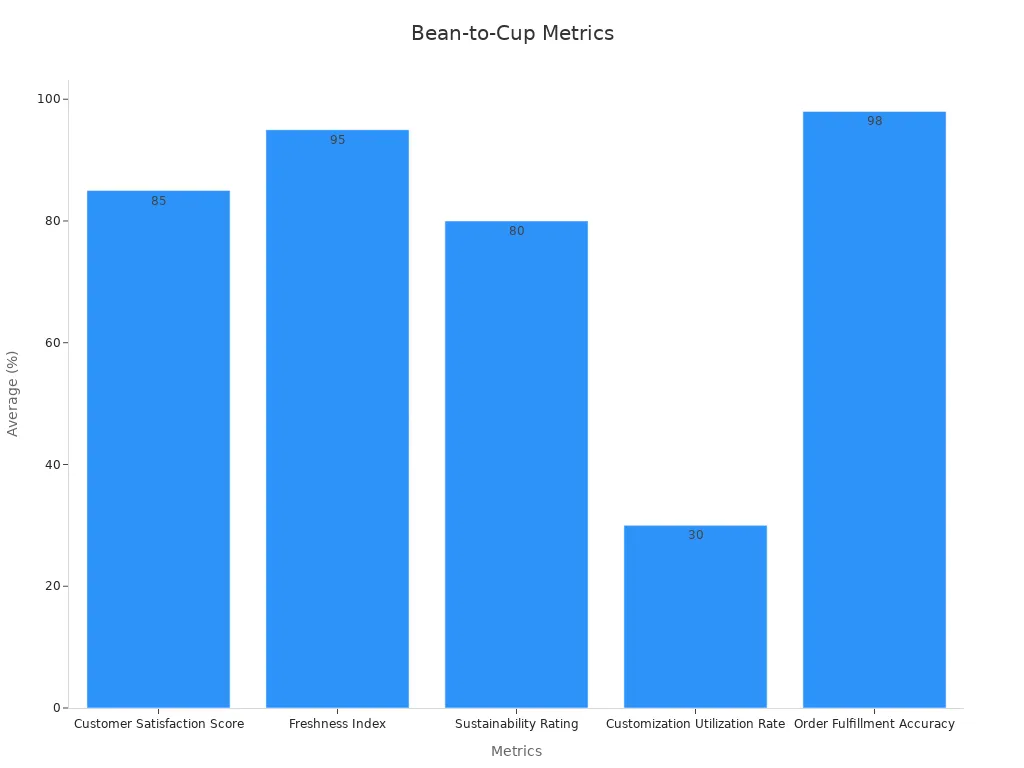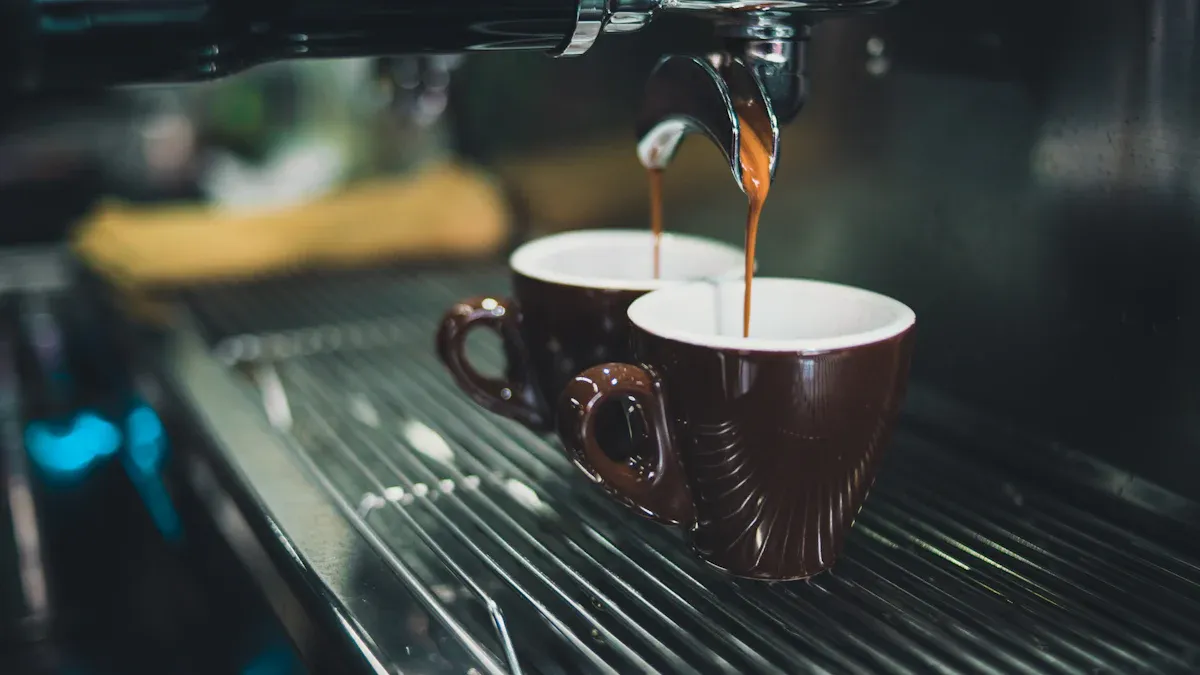
Choosing the right coffee machine can feel like navigating a maze. With the global market projected to hit USD 8.47 billion by 2032, the options are endless. Rising inflation and environmental concerns add to the challenge. Coffee machine manufacturers are innovating to meet these demands, but how do you find the perfect fit for your needs?
Key Takeaways
- Picking the right coffee machine makes your coffee taste better. Choose machines with good temperature control for great results.
- Think about your daily routine when picking a coffee machine. Automatic ones save time, but manual ones give more control for brewing lovers.
- Match your budget with the coffee machine’s worth. Spending on quality and eco-friendly machines can bring long-term happiness and savings.
Why the Right Coffee Machine Matters
Enhancing coffee quality and taste
A good coffee machine can transform an ordinary cup into a delightful experience. While personal preferences play a big role in how coffee is enjoyed, the machine’s features can make a noticeable difference. Expert coffee drinkers often point out subtle variations in flavour and aroma based on the brewing method. Machines with advanced brewing technology, like precise temperature control or adjustable pressure, help extract the best from coffee beans. Even a beginner can brew café-quality coffee with the right equipment.
Suiting your lifestyle and routine
The perfect coffee machine should fit seamlessly into your daily life. For busy mornings, an automatic machine can save time by brewing coffee with just a button press. Those who enjoy the process of making coffee might prefer a manual machine, which allows for more control. Compact designs work well for small kitchens, while larger models with multiple features suit families or coffee enthusiasts. Choosing a machine that matches your routine ensures you’ll actually use it and enjoy the convenience it brings.
Balancing budget and value
Investing in a coffee machine is about finding the right balance between cost and quality. The market offers a wide range of options, from budget-friendly models to premium machines with smart features like voice control. Many consumers are willing to spend more for better quality and eco-friendly designs. For example, manufacturers are now focusing on sustainability by creating energy-efficient machines that reduce waste. The table below highlights key trends shaping the coffee machine market:
| Key Insights | Description |
|---|---|
| Technological Advancements | The market is driven by smart features like voice control and IoT capabilities. |
| Consumer Preferences | There is a growing demand for premium coffee machines, indicating a willingness to invest for better quality. |
| Sustainability Focus | Manufacturers are prioritising eco-friendly designs to reduce waste and energy consumption. |
| Market Growth | Emerging regions are expected to see rapid growth as disposable incomes rise. |
By understanding these trends, buyers can make informed decisions that align with their budget and values.
Types of Coffee Machines
Choosing the right coffee machine starts with understanding the different types available. Each type offers unique features, benefits, and drawbacks, making it essential to match the machine to your preferences and lifestyle.
Manual Coffee Machines
Manual coffee machines are perfect for those who enjoy the art of coffee-making. These machines require hands-on effort, allowing users to control every aspect of the brewing process, from grinding the beans to adjusting the pressure. They often appeal to traditionalists and coffee enthusiasts who value flavour depth and the satisfaction of crafting their own cup.
Tip: Manual machines, like the Flair 58, feature an electronically heated brew head for consistent temperature, ensuring a perfect shot every time. Users also appreciate their sturdy build and elegant wooden handles.
However, these machines can be challenging for beginners. They demand practice and patience to master. Despite this, many users find the effort worthwhile for the superior taste and customisation they offer.
| Feature | Description |
|---|---|
| Design | Manual lever-style, appealing to traditional coffee brewing enthusiasts. |
| Heating Technology | Electronically heated brew head for consistent brewing temperature. |
| Build Quality | Incredibly well-built with wooden handles. |
| Pressure Gauge | Includes a manometer for shot consistency. |
Automatic Coffee Machines
Automatic coffee machines simplify the brewing process. With just a press of a button, these machines handle everything from grinding the beans to frothing the milk. They are ideal for busy individuals who want a quick, high-quality cup without the hassle.
Many automatic machines come with advanced features like user profiles and self-cleaning modes. This makes them convenient and user-friendly. However, they tend to be more expensive and require regular maintenance to keep them in top condition.
| Condition | Mean (M) | Difference (δ) | Standard Error (SE) | p-value |
|---|---|---|---|---|
| Manual Coffee-Making | 3.54 | |||
| Automatic Coffee-Making (Week 2) | 2.68 | 0.86 | 0.24 | < 0.05 |

Capsule Coffee Machines
Capsule coffee machines are all about convenience. They use pre-packaged pods to brew coffee quickly and with minimal cleanup. These machines are compact and easy to use, making them a popular choice for small kitchens or offices.
Note: While capsule machines offer a variety of flavours, they often lack the depth of taste found in freshly brewed coffee. Additionally, the environmental impact of single-use capsules is a concern for many users.
| Coffee Machine Type | Pros | Cons |
|---|---|---|
| Capsule | - Simple and convenient. |
- Variety of flavours.
- Minimal cleanup. | - Lacks depth of flavour.
- Environmental concerns with capsules.
- More expensive in the long run than ground coffee. |
Bean-to-Cup Coffee Machines
Bean-to-cup machines are the ultimate choice for coffee lovers who value freshness. These machines grind the beans right before brewing, ensuring a rich and aromatic cup every time. They are fully automated, making them easy to use and mess-free.
Customer satisfaction metrics highlight their popularity. With an 85% satisfaction score and a 95% freshness index, these machines deliver quality and convenience. However, manual espresso machines still produce better-tasting coffee for those who prioritise flavour over automation.

Filter Coffee Machines
Filter coffee machines are perfect for brewing large quantities of coffee. They are simple to use and produce great-tasting black coffee, making them ideal for families or gatherings. These machines are not the best choice for those who prefer milk-based drinks like lattes or cappuccinos.
Tip: If you enjoy black coffee and need to serve multiple people, a filter coffee machine is a practical and efficient option.
Manual Brewers
Manual brewers, such as the Chemex or Hario V60, offer a hands-on approach to coffee-making. They allow users to control the brewing process, resulting in a cup tailored to their taste. These brewers are affordable, portable, and perfect for those who enjoy experimenting with different techniques.
Unlike immersion methods, manual brewers use infusion techniques to enhance extraction efficiency. This ensures a constant supply of fresh water, improving the overall flavour. While they can be a bit messy, the quality of the coffee often outweighs the inconvenience.
Key Features of a Coffee Machine

Brewing pressure and quality
Brewing pressure plays a vital role in crafting the perfect espresso. Machines with precise pressure control ensure consistent extraction, which directly impacts flavour and aroma. For instance:
- Proper pressure regulation maintains the balance between flow rate and extraction time.
- Advanced machines allow users to adjust pressure, enhancing the coffee’s quality.
- Without stable pressure, the espresso’s taste can become bitter or weak.
Baristas often highlight the importance of maintaining the standard 9-bar pressure for optimal results. A finer grind size can increase pressure drop, leading to slower extraction. This highlights the need for machines that can handle such variations effectively.
Milk frothing capabilities
For those who love cappuccinos or lattes, milk frothing is a must-have feature. High-quality frothers create creamy, velvety textures that elevate milk-based drinks. Here’s a comparison of popular frother brands:
| Frother Brand | Aeration | Texture Quality | Mixing Capabilities | Ease of Use |
|---|---|---|---|---|
| Breville | High | Creamy | Excellent | Easy |
| Nespresso | High | Velvety | Excellent | Easy |
| Ninja | Medium | Frothy | Fair | Easy |
A good frother not only enhances the drink but also simplifies the process for users.
Thermoblock and heating technology
Thermoblock technology ensures water heats quickly and consistently, which is crucial for brewing. Modern advancements, like PID controls, have improved temperature stability in machines. For example:
| Technology Type | Description | Advancements |
|---|---|---|
| PID Controls | Standardised temperature controls. | Improved brewing consistency. |
| Lightweight Groups | Electrically heated designs. | Enhanced efficiency and performance. |
These innovations make it easier to achieve the perfect brewing temperature every time.
Energy efficiency and wattage
Energy efficiency is a growing concern for many buyers. Coffee machines vary in wattage, which affects both performance and energy consumption. Here’s a breakdown:
| Type of Coffee Machine | Wattage Consumption (watts) |
|---|---|
| Drip Coffee Makers | 750 to 1200 |
| Espresso Machines | 1000 to 1500 |
| Bean-to-Cup Machines | 1200 to 1800 |
Choosing a machine with the right wattage ensures a balance between energy use and brewing speed.
Cleaning and maintenance ease
A machine that’s easy to clean encourages regular upkeep, extending its lifespan. Features like stain-proof materials and simple maintenance tasks make a big difference. For example:
- Stainless steel components resist stains and simplify cleaning.
- Quick tasks, like wiping the shower screen, keep the machine in top condition.
- Affordable replacement parts, such as O-rings, reduce long-term costs.
These features ensure the coffee machine remains reliable and efficient over time.
Choosing a Coffee Machine for Your Needs
Coffee preferences (e.g., espresso, cappuccino, black coffee)
Coffee preferences play a significant role in selecting the right coffee machine. Espresso lovers might lean towards machines with high-pressure brewing capabilities, such as manual or automatic espresso machines. Those who enjoy cappuccinos or lattes should consider models with advanced milk frothing systems. For black coffee enthusiasts, filter coffee machines or manual brewers like the Chemex are excellent choices.
The growing demand for diverse coffee types among young, urban consumers highlights the importance of matching a machine to individual tastes. Many are willing to invest in premium options that deliver quality and variety. This trend underscores the need for machines that cater to specific preferences while maintaining ease of use.
Time and convenience considerations
Time efficiency is crucial for many coffee drinkers. Automatic coffee machines, for instance, can brew a cup in under a minute, making them ideal for busy mornings. Employees with access to commercial machines save nearly 87 hours annually by avoiding café queues. This convenience not only boosts productivity but also enhances user satisfaction.
The global market for automatic coffee machines, valued at USD 4.4 billion in 2023, reflects this demand. With a projected growth rate of 6.1% from 2024 to 2032, it’s clear that consumers value quick, high-quality brewing options. Machines that combine speed and simplicity are becoming increasingly popular.
Skill level and brewing interest
Brewing interest and skill level often determine the type of coffee machine a person chooses. Beginners might prefer capsule machines for their simplicity, while enthusiasts may opt for manual machines that offer greater control. The rising popularity of single-serve coffee makers and espresso machines indicates a growing interest in brewing technologies that balance convenience with quality.
Durability and performance are also key factors for those who enjoy experimenting with different brewing methods. Machines that deliver consistent results while accommodating various skill levels are highly sought after.
Budget and Long-Term Costs of a Coffee Machine
Initial purchase price
The upfront cost of a coffee machine varies widely. Entry-level models start at around £50, while high-end machines can exceed £1,000. Buyers should also consider accessories like grinders, milk frothers, or reusable filters, which add to the initial expense. Investing in a machine that matches your needs ensures you won’t overspend on unnecessary features.
Tip: Premium machines often come with advanced brewing technology and durable materials, making them a better long-term investment.
Maintenance and repair expenses
Routine maintenance keeps a coffee machine running smoothly. Cleaning supplies, descaling solutions, and replacement parts like filters or seals contribute to ongoing costs. Repairs can be more expensive, especially for machines with complex mechanisms. For instance, replacing a thermoblock or pump might cost £100 or more.
Some manufacturers offer warranties or service plans, which reduce repair expenses. However, buyers should factor in depreciation—the machine’s value decreases over time, affecting its resale potential.
Ongoing costs (e.g., pods, beans, filters)
Daily coffee-making comes with operational costs. Pods for capsule machines are convenient but pricey, often costing £0.30 to £0.50 per cup. Beans or ground coffee are more economical, with prices ranging from £5 to £15 per kilogram. Filter coffee machines require paper filters, which add a small but consistent expense.
Energy and water usage also impact costs. Machines with higher wattage consume more electricity, increasing utility bills. Choosing energy-efficient models can help minimise these expenses.
Callout: A comprehensive financial study outlines the combined impact of these factors:
- Initial purchase price.
- Operational costs for energy, water, and coffee supplies.
- Maintenance and repairs.
- Training costs for staff (if applicable).
- Depreciation over time.
Sustainability and Maintenance of Coffee Machines
Recycling and waste management
Coffee machines can contribute to waste if not designed with sustainability in mind. Many modern machines now include features that help reduce their environmental footprint. For example, reusable filters eliminate the need for disposable paper ones, cutting down on waste. Machines compatible with biodegradable coffee pods also offer a greener alternative to traditional capsules.
Tip: Look for machines with recyclable components or those made from sustainable materials. These options not only benefit the environment but also promote responsible consumption.
Proper waste management extends beyond the machine itself. Regular maintenance, such as descaling and cleaning, ensures the machine operates efficiently. This reduces energy waste and prolongs its lifespan, preventing premature disposal.
Repairability and durability
Durability plays a key role in sustainability. A well-built coffee machine can last for years, reducing the need for frequent replacements. Machines with modular designs make repairs easier, as individual parts can be replaced without discarding the entire unit.
Some manufacturers now prioritise repairability by offering spare parts and repair guides. This approach not only saves money but also reduces electronic waste. Buyers should consider brands known for their robust build quality and long-term support.
Eco-friendly machine options
Eco-friendly coffee machines are becoming increasingly popular. These models often feature energy-efficient brewing processes that minimise power consumption while delivering excellent coffee. Many also use sustainable materials like stainless steel or recycled plastics in their construction.
- Energy-efficient brewing maximises flavour extraction while reducing electricity use.
- Reusable filters and pods decrease reliance on disposable products.
- Machines with automatic shut-off functions save energy when not in use.
Choosing an eco-friendly machine benefits both the planet and your wallet, making it a smart investment for environmentally conscious coffee lovers.
Choosing the right coffee machine can make a world of difference in your daily routine. It’s not just about brewing coffee; it’s about finding a machine that fits your taste, lifestyle, and budget. Thinking long-term? Consider how easy it is to maintain, its sustainability features, and the overall value it brings to your life.
FAQ
What type of coffee machine is best for beginners?
Capsule coffee machines are ideal for beginners. They’re simple to use, require minimal effort, and deliver consistent results. Perfect for anyone starting their coffee journey! ☕
How often should I clean my coffee machine?
Clean your coffee machine weekly to maintain performance. Descale it every 1-3 months, depending on water hardness and usage. Regular cleaning ensures better-tasting coffee.
Can I use any coffee beans in a bean-to-cup machine?
Yes, most bean-to-cup machines work with any coffee beans. However, medium roast beans often provide the best balance of flavour and aroma.
Post time: Apr-28-2025


